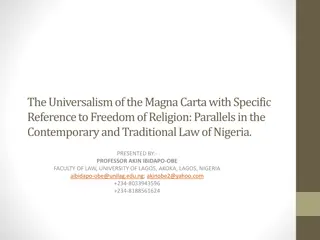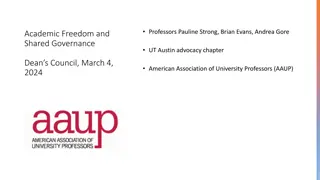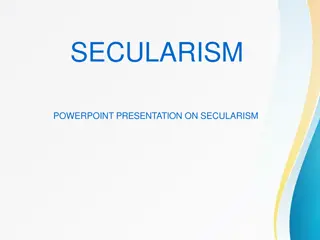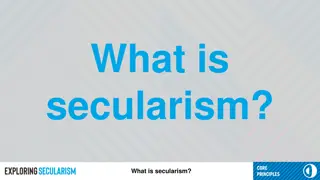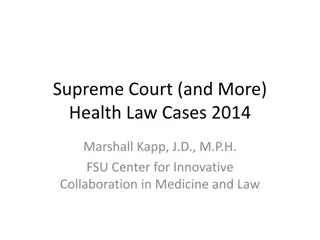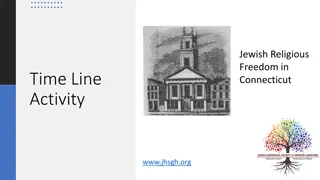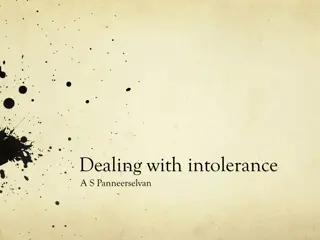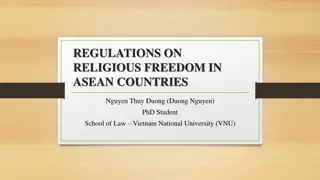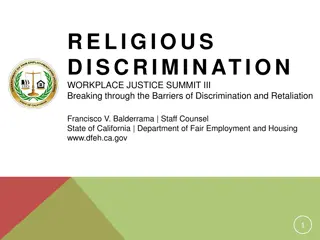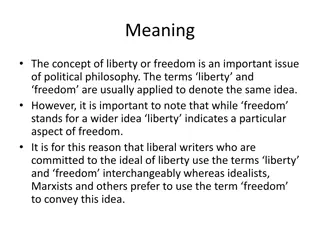Challenges to Religious Freedom in India: An Overview
India, as the world's largest democracy with a tradition of secularism, faces escalating challenges to religious freedom and civil society. The BJP-led government's Hindu nationalist agenda has led to systematic violations of religious rights, targeting minorities and activists. The tightening grip on civil society through laws like the FCRA has raised concerns about freedom of expression and association.
Download Presentation

Please find below an Image/Link to download the presentation.
The content on the website is provided AS IS for your information and personal use only. It may not be sold, licensed, or shared on other websites without obtaining consent from the author.If you encounter any issues during the download, it is possible that the publisher has removed the file from their server.
You are allowed to download the files provided on this website for personal or commercial use, subject to the condition that they are used lawfully. All files are the property of their respective owners.
The content on the website is provided AS IS for your information and personal use only. It may not be sold, licensed, or shared on other websites without obtaining consent from the author.
E N D
Presentation Transcript
Praying for Persecuted India Abraham Sekhar www.globalATM.net spiritfilledchurchesofindia@gmail.com
W W W . U S C I R F . G O V A N N U A L R E P O R T 2 0 2 1 UNITED STATES COMMISSION ON INTERNATIONAL RELIGIOUSFREEDOM 22 U S C I R F | A N N U A L R E P O R T 2 0 2 1USCIRF RECOMMENDED FOR COUNTRIES OF PARTICULAR CONCERN (CPC) INDIA
INDIA Background is the world s largest democracy, with a rich tradition of secular pluralism. Its estimated population exceeds 1.3 billion: 79.8 percent Hindu, 14.2 percent Muslim, 2.3 percent Christian, and Smaller religious groups include Buddhists, Jains, Baha is, Jews, Zoroastrians (Parsis), and non1.7 percent Sikh. India s constitution establishes the nation as secular, and Article 25 grants all individuals freedom of conscience, including the right to practice, profess, and propagate religion.
INDIA Background Yet, in recent years, the BJP-led government has challenged the secular principles of the constitution by implementing laws and policies at the national and state levels promoting Hindu nationalism, thereby posing severe challenges to freedom of religion or belief and related rights. Throughout 2020, the national and state governments perpetration and toleration of these systematic, ongoing, and egregious violations led to increasing repression of religious freedom and a growing climate of hostility and violence toward religious minorities, human rights advocates, and others speaking out against such violations.
Closing Space for Civil Society through the FCRA and Other Laws Throughout 2020, members of civil society, including human rights advocates and media reporting on religious freedom violations, faced intimidation and harassment. Government officials used the Unlawful Activities Prevention Act (UAPA) and other statutes to detain advocates, media, and academics, including religious minorities. The national government has taken several steps to limit engagement and support of NGOs, especially religious and human rights organizations.
Closing Space for Civil Society through the FCRA and Other Laws The FCRA regulates the inflow of foreign funds to NGOs. In September, the FCRA was amended to place further restrictions on NGOs, including reducing the amount of foreign funds that could be used for administrative expenses and requiring that accounts be held in a government-designated bank. In recent years, government officials have revoked or suspended the FCRA licenses of thousands of NGOs, including numerous Christian and other religious and human rights organizations.
Report from United Christian Forum 2021 ends as Most Violent year for Christians in India 486 Registered Incidents of Violence and Hate shocks the Nation New Delhi 31 December 2021, The National slogan of Sab Ka Saath, Sab Ka Vikas has proved to be a hollow, rhetorical bell for the Christian Minority population of India. The steady year-on-year increase in violence against the peace-loving community escalated in the last quarter to alarming numbers. Authenticated complaints reveal more than one and a half incidents a day, totaling nearly 500 this year as reported with UCF.
Report from United Christian Forum The atmosphere of hatred spread by certain actions and speeches by certain groups and the false propaganda of fraudulent and allurement means of conversion including enactment of laws in the name of freedom of religion seem to be encouraging the anti-social elements to do so. It will not be exaggerating if it is said that these incidents are well- orchestrated and pre-planned acts by certain vested groups to divide the country on the basis of religion.
Report from United Christian Forum In almost all incidents reported across India, vigilante mobs composed of religious extremists have been seen to either barge into a prayer gathering or round up individuals that they believe are involved in forcible religious conversions. With impunity, such mobs criminally threaten, physically assault people in prayer, before handing them over to the police on allegations of forcible conversions. Often communal sloganeering is witnessed outside police stations, where the police stand as mute spectators. Sadly, this violence against the Christian community is compounded by the failure of the police to investigate and prosecute mobs and perpetrators.
Ghar Wapsi: Political Implications of the Ghar Wapsi Approach in a Secular State- reconversions and the cultural as well as political implications of this tendency cannot be understood independent of the current political clime of the country and its traditional stance with regard to the interface between religion and politics. The 2014 general elections saw the return of an NDA (National Democratic Alliance) government, following the previous stint between 1998 and 2004 under the Prime Ministership of Atal Bihari Vajpayee.
Ghar Wapsi: Political Implications of the Ghar Wapsi The Modi-led government swept the elections with 38.5% vote share between the various members of the NDA alliance amidst much fanfare and expectation. True to the rise of the BJP as a political party, the win was heralded importantly as a change from the disappointment of the UPA government and Congress era while also being positioned as the rightful representative of Hindu interests (Basu 1996). It was evident that goals of secular economic development were not achieving the targets that were promised and sections of the population were coming to question the need for this secularism at all.
Ghar Wapsi: Political Implications of the Ghar Wapsi India s secular identity is not, however, devoid of its own debates, not least of which are the challenges in the Indian social fabric and even the Indian understanding of the term itself. Sen delineates the biggest challenges to secularism in the Indian context as being communal fascism (use of violence to achieve sectarian threats, victimizing specific communities, etc.), sectarian nationalism (discourse of two nations in undivided India followed by misdeeds of Muslims) and militant obscurantism (using archaic beliefs to generate extremism) (Sen 1993). It is, however, arguable that the bigger debate at hand is the very definition of secularism itself. While the Western world perceives this concept as heralding the separation between state and church, India adopts the Gandhian notion of sarva dharma samabhava or tolerance towards equidistance from all religions.
Excerpts from a secular paper In a report by OpenDoors, a religious freedom watchdog working towards serving persecuted Christians worldwide: First, the increased dominance of Hindutva ideology within Indian society appears to have created the conditions necessary for increased persecution. Second, state Anti-conversion laws operate The United Progressive Alliance (UPA) is a coalition of left and centre-left political parties in India.
Excerpts from a secular paper The increasing unease amongst religious minorities was recognized even by individuals of public standing, with the outgoing Vice President of the country, Hamid Ansari, saying in his final official interview that there was a feeling of unease amongst Muslims in the country because of growing intolerance (Scroll 2017). In 2015, research conducted by Pew reported that India was ranked fourth in the world (behind Syria, Nigeria, and Iraq) for highest social hostilities involving religion (S 2017).
Excerpts from a secular paper By understanding the Hindu as the traditional spirituality of the Indian subcontinent, this ideology can make the seemingly self- contradictory claim that conversion from Islam or Christianity is not a religious conversion but rather a coming home or a returning to one s true, ancestral spiritual identity. In stark contrast, the citizens of India who do not share the Hindutva stance be they Muslims, Christians, secular Hindus or others look upon Ghar Wapsi as an alarming trend which threatens both individual religious freedom and the constitutional mandated secularism of India governance.
From my Masters Degree Thesis submitted to Liberty University in 2019 Liberty University Helms School of Government Is There a Need for Restoration of Justice in Democratic India? Thesis By Abraham Sekhar December 4, 2019 in partial fulfillment of the requirements for the completion of Master of Arts Degree in Public Policy
Addressing the Major Issues in the Government One-man Raj (Rule) Healthcare Issues Land Reforms The Administration Social Issues Economic Issues Law and Order Justice and Judiciary system/Judiciary in India/Hierarchy of Courts and Justice System in India
The Need for Restoration of Justice and Recommended Policy Proposals He gave Himself for us to redeem us from all wickedness Titus 2:14, NIV Downsizing Government Welfare of the Poor Basic Necessities Healthcare Trade Barriers Privatization Living Standards Foreign Policy Civil Society and Institutions Religious Persecution Continuation of Autocratic Actions Need for Reversing the Prevailing Conception The Vision and Commitment of Modi
Prayer Points Praying for the Government and authorities: Praying for Persecutors-individuals and organizations Praying for the persecuted families, leaders and orphaned children Reaching the unreached a large population; remember the promise personally revealed to Abraham about 50%. The Indian Church-Ekklesia to get united and rise up and pray with fasting Removal of Prohibition to missionaries and mission funds Worship places, Social service organizations, Christian schools and hospitals for protection and freedom. Baptisms, marriages and marriage ceremonies to continue. Justice and righteousness to prevail.




